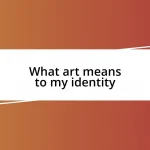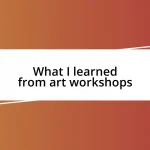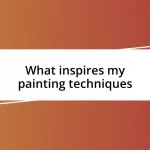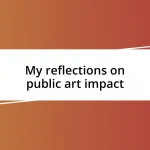Key takeaways:
- Improvisational comedy thrives on spontaneity, collaboration, and the principle of “yes, and,” which fosters creativity and connection among performers.
- Through challenges like stage fright and collaboration dynamics, embracing mistakes and spontaneity leads to personal growth and unexpected comedic moments.
- Improv skills transcend the stage, enhancing everyday interactions by promoting open communication, humor, and deeper connections in personal and professional settings.

Understanding Improvisational Comedy
Improvisational comedy, or improv, is a unique art form that thrives on spontaneity and creativity. From my experience, it feels like being part of a thrilling dance where each performer builds off the energy and ideas of the others. Have you ever been in a situation where you had to think on your feet? That’s precisely what improv demands: quick thinking and a willingness to embrace the unexpected.
I remember the first time I stepped onto an improv stage—my heart raced as I realized I had no script to lean on. In that moment, the only rule was to say “yes, and,” which means accepting whatever your partner gives you and adding to it. This principle not only drives the scenes forward but also fosters an environment where creativity flourishes. It’s both terrifying and exhilarating to realize that the whole performance hinges on collaboration and trust.
Improvisational comedy is more than just making jokes; it’s about connection and vulnerability. I’ve learned that sharing a laugh often breaks down barriers, revealing our shared humanity. When performers step into the spotlight, they not only entertain but also invite the audience to join them on a journey of unpredictability—an experience filled with laughter, surprise, and sometimes, a little bit of magic. Have you ever wondered what it would be like to let go of control and just embrace the moment? That’s the beauty of improv.

My Journey into Improv
When I think back to my initial plunge into the world of improv, I can still recall the mix of excitement and dread. It was a rainy afternoon, and I was waiting outside a small theater for my first class. With each raindrop, I felt my nerves intensify—what if I couldn’t keep up? But as soon as I stepped inside, the laughter and energy of the group wrapped around me like a warm blanket, instantly washing away my fears.
As I began participating in various exercises, I learned the joy of spontaneity; it was like a game of verbal chess, where each move could lead to unexpected places. One moment, I was a space pirate seeking treasure, and the next, I was negotiating with an imaginary alien. These experiences taught me that imagination truly has no bounds in improv. I vividly remember a scene where we had to create a restaurant out of thin air; I was the chef who accidentally added glitter to the soup. The audience roared, but it was the shared spontaneity with my fellow performers that made it truly magical.
Through countless scenes and laughter, I discovered that improv not only sharpened my instinct to think quickly but also helped me embrace failure. It was liberating to understand that mistakes are not just acceptable but essential to learning and growth in this art form. I once flubbed a punchline so badly that I ended up creating an entirely new character who interpreted life through a quirky lens. That moment reinforced my belief that in improv, the strength lies in owning whatever happens and turning it into something beautiful.
| Comparison of My Initial Improv Experience | Subsequent Improv Growth |
|---|---|
| Nerves and Fear | Embracing Spontaneity |
| Exciting But Intimidating | Thriving on Unexpected Ideas |
| Focus on Perfection | Acceptance of Mistakes |
| Limited Creativity | Boundless Imagination |

Key Techniques in Improv
The beauty of improv lies in its foundational techniques, which transform uncertainty into spontaneous brilliance. One that fundamentally shifted my approach was the concept of “yes, and.” I remember a moment during a workshop when a fellow performer declared we were all squirrels planning a heist for the best acorns. Instead of hesitating or denying that absurd idea, I jumped in, building on it, and suddenly we were a band of misfit squirrels caught in wild schemes. This willingness to accept and add creates a supportive atmosphere that fuels creativity and connection among performers.
Here are some key techniques that enhance improvisational skills:
- Yes, And: Accepting offers and building upon them fosters collaboration.
- Listening: Truly hearing your scene partners allows for more organic interactions.
- Character Commitment: Embrace your character fully — the fun often lies in their quirks.
- Emotional Truth: Engage with genuine feelings to deepen the authenticity of scenes.
- Platforming: Elevating your partner’s ideas ensures everyone has a chance to shine.
One day, during a scene where I was an overly dramatic cat who thought I was an opera singer, I channeled every ounce of emotion into my performance. The laughter from the audience energized me, reinforcing the value of emotional truth in improv. It’s moments like this that remind me how each technique weaves into the fabric of performance, creating a tapestry of laughter, improvisation, and unpredictability.

Challenges Faced in Improv
One of the biggest challenges I faced in improv was the fear of making a mistake. I can vividly remember a time when my mind went blank during a scene, leaving me frozen like a deer in headlights. It felt like everyone was waiting for me to deliver a punchline, yet nothing came. In that moment, I had to remind myself that imperfection is part of the journey. How liberating it was to realize that every misstep could lead to an unexpected twist!
Another hurdle was dealing with the pressure of collaboration. The dynamics of working with different personalities can be tricky. I recall an instance where a scene partner kept steering the direction I wasn’t comfortable with, which naturally threw me off. It made me question my instincts and spark a bit of frustration. I learned that successful improv requires open communication and a willingness to compromise, a dance between individual creativity and group harmony.
Lastly, there’s the challenge of spontaneity itself. Just when you think you’ve mastered the art of thinking quickly, an unpredictable situation can throw you off balance. I remember being tasked to create a scene in a crowded space where distractions were everywhere. It was tough to stay in the moment amidst the chaos, yet that’s when I discovered the beauty of improvisation: embracing the unexpected can lead to the most memorable and joyful experiences. Have you ever faced such challenges in your artistic endeavors? It’s a learning process, isn’t it?

Learning to Think Quickly
Thinking quickly is an essential skill I honed through my journey in improv. I recall a time during a practice session when we were unexpectedly interrupted by loud music from a neighboring event. Instead of letting the distraction derail us, I found myself drawing upon the chaos. I shouted a silly line about being at a “disco funeral,” and suddenly we were wildly embodying guests dancing wildly amidst the most somber occasion. That moment taught me how to pivot my thoughts instantly and turn distractions into comedic opportunities.
Another instance that cemented my ability to think on my feet occurred during a performance where I had to conjure up a character on the spot. With no time to prepare, I became a paranoid baker convinced everyone was out to steal my secret ingredient. That moment of instant creativity was exhilarating! It drove home the fact that when faced with the unexpected, my mind could produce unexpected gems. I often wonder if anyone else has experienced that rush of adrenaline that comes from needing to make quick decisions under pressure.
Over time, I realized that quick thinking is less about having the perfect response and more about being willing to embrace whatever comes your way. There was a scene where my partner and I accidentally mixed up our characters’ names, and instead of correcting ourselves, we leaned into it. The absurdity of our newly established identities sent us into fits of laughter and spontaneity. It highlighted how improvisational comedy can turn any situation into something fantastic. Have you had moments like this in your creative pursuits? What if we stopped worrying about getting it right and started celebrating the unexpected twists life throws our way?

Collaborating with Other Performers
Collaborating with other performers in improv is a dance of creativity and trust. I still remember the first time I stepped onto the stage with a complete stranger. Initially, there was nervous energy as we navigated our chemistry. Yet, with every shared laugh and unexpected idea, I sensed the connection deepen. It’s fascinating how synergy can transform a scene, making it spontaneous in ways you can’t plan for.
In another memorable experience, I was teamed up with a performer whose style was vastly different from mine. At first, I felt the pull to play it safe, sticking to what I knew. However, as we started to play off each other, I discovered new comedic angles I wouldn’t have explored alone. We laughed at our differences and embraced the wild moments that emerged, revealing the strength of blending varying perspectives. Have you ever had a surprising collaboration that unexpectedly pushed your boundaries?
The heart of collaboration lies in the unscripted moments we create together. I recall a scene where we accidentally created an entire narrative around a missing sock. It started as a simple joke, but as we fed off one another’s energy, it morphed into a saga of epic proportions. That’s the magic of improv—it can take you down delightful rabbit holes of creativity when you trust your partner. And isn’t that what makes teamwork so essential in the artistic process? Embracing the unpredictability of others can lead to moments that are truly unforgettable.

Applying Improv Skills in Life
Applying improv skills in everyday life has vastly enriched my interactions and perspective. I remember a day at work when a colleague was struggling with a complicated project. Instead of offering a rigid solution, I decided to approach our brainstorming session like an improv scene. I encouraged my colleague to toss out wild ideas, no matter how outlandish, and to my surprise, we stumbled upon a uniquely brilliant concept that neither of us had considered before. Have you ever found that letting go of strict limitations opens up a world of creativity?
Another interesting application came during a family gathering where tensions ran high. Rather than letting disagreements spiral, I crafted a light-hearted game that involved each member acting out exaggerated roles based on their quirks. The laughter broke the ice, and soon people were sharing stories instead of grievances. It dawned on me that humor can be a powerful tool to diffuse difficult situations. Has humor ever helped you bridge the gap in a tense scenario?
In day-to-day conversations, I find that the listening skills enhanced by improv create deeper connections. I was chatting with a friend recently when she mentioned feeling stuck in her career. Instead of jumping in with solutions or advice, I embraced the ‘yes, and’ approach. I mirrored her feelings, built upon them, and watched as she discovered her own answers through our dialogue. It’s amazing how often we hold the keys within ourselves! Doesn’t it feel rewarding to be part of someone else’s revelation? Applying improv in life isn’t only about being funny; it’s about being present and adaptable in the moment.














